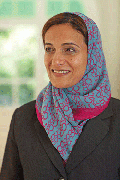
|
| Sheikha Lubna al Qassimi |
The U.S. first lady Michelle Obama topped the list. Three other Arab women made the top 100: Sheikha Mozah, the first lady of Qatar, was ranked 74th, followed by Queen Rania of Jordan in 76th place. Maha al Ghunaim, a Kuwaiti businesswoman who co-founded the bank Global Investment House, was number 94.
In a statement issued yesterday, Sheikha Lubna called the result a “UAE global achievement.” Policies adopted by the national leadership, beginning with Sheikh Zayed, the country’s founder, have “bolster[ed] the role of UAE women in sustainable development as well as their international and regional status,” she said. There is a “keen interest in advancing women’s roles in social and economic development” within the UAE’s leadership, she said, calling for greater “diligence and creativity” among Emirati women.
The news of Sheikha Lubna’s listing by Forbes magazine was welcomed by other female politicians and by academics in the UAE, who said that it was a well-deserved recognition not only of her own personal and professional achievements, but also those of the country in advancing the interests of women.

|
| Sheikha Mozah |
“The award definitely highlights the fact that there isn’t any role today in UAE society that women haven’t entered,” Ms. al Awadhi said. “They might not represent a majority or be equal in numbers with men, but they made an entrance into areas dominated previously only by men.” Global recognition of a woman whom many Emiratis see as an example helps dispel the dominant image of Muslim and Arab women as marginalized and oppressed, she said.
“Yes, there are some countries where Islam is distorted to oppress women, but clearly that is not the rule,” said Ms. al Awadhi. “It reinforces the idea that Islam isn’t an obstacle to women’s empowerment and it inspires other women to work hard.” Still, “it would be naive to say there are no challenges,” she said. Without the Government’s political will, it would have been more difficult for women to enter politics, a field “predominantly still run by men,” she said.

|
| Queen Rania |
Another challenge is to institutionalize the idea that candidates for top positions are chosen based on merit, she said.
Dr. Nawar Golley, a specialist in women’s studies at the American University of Sharjah, said the honor was especially valuable because it gave recognition internationally to a woman involved directly in policy making and who is a symbol of the advancement of women in the Gulf.
“With Sheikha Lubna being so instrumental in this change in the UAE and the whole Gulf region, it is very good for women and very important that a woman in her position can be recognized internationally,” Dr. Golley said.
Sheikha Lubna provides a role model to younger generations, along with other successful diplomats like th

e UAE’s female ambassadors, she said.
Sheikha Lubna is the UAE’s first female cabinet minister, appointed in 2004 as the Minister of Economy, and later as the Minister of Foreign Trade. She is a member of Sharjah’s ruling family and studied computer science at California State University, Chico.
|
Maha al Ghunaim |
It credits Sheikha Lubna, an “observant Muslim,” for fighting to improve women’s rights in the region.
FORBES 100 Most Powerful Women
Top Arab women:
70. Sheikha Lubna al Qassimi
74. Sheikha Mozah, first lady of Qatar
76. Queen Rania of Jordan,
94. Maha al Ghunaim, Kuwaiti businesswoman.
Top five overall:
1. Michelle Obama, U.S. first lady
2. Irene Rosenfeld, chief executive of Kraft Foods
3. Oprah Winfrey, talk show host
4. Angela Merkel, chancellor of Germany
5. Hillary Clinton, U.S. Secretary of State.






Leave a Reply